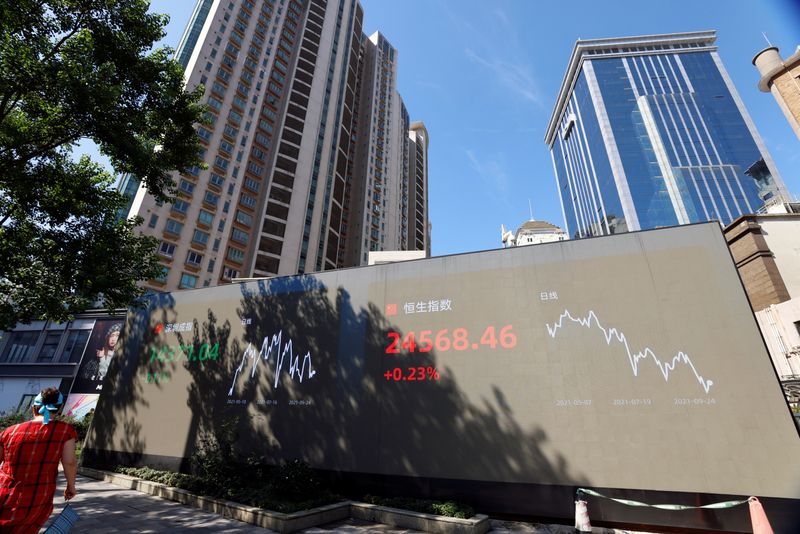
© Reuters. FILE PHOTO: A woman walks by an electronic display showing the Shenzhen and Hang Seng stock indexes, in Shanghai, China, September 24, 2021. REUTERS/Aly Song
By Andrew Galbraith
SHANGHAI (Reuters) – Asian shares fell on Friday following the biggest quarterly drop in global equities in two years, as investors worried about the impact of the Russian-Ukrainian war and rising risks of recession.
On Thursday, Russian President Vladimir Putin struck back at Western sanctions on Moscow, threatening to halt contracts supplying Europe with a third of its gas unless they are paid in roubles. The move prompted Germany, the most reliant on Russian gas, to accuse him of “blackmail” as it activated an emergency plan that could lead to rationing.
Reflecting the gloomy mood as a result of supply disruptions and surging raw material costs, Japanese business confidence hit a nine-month low in the first quarter according to a Bank of Japan survey, with companies indicating they expect conditions to worsen further.
In Tokyo, the was down 0.75% in morning trade, while MSCI’s broadest index of Asia-Pacific shares outside Japan was 0.70% lower.
Hong Kong’s dipped 1.1%, while Seoul’s Kospi lost about 0.6%. Chinese blue-chips turned around from a lower open to rise 0.7%.
MSCI’s global share index, and U.S. and European shares all notched their biggest quarterly drops since the outbreak of the COVID-19 pandemic in 2020 in the quarter that ended on March 31. Investors have been worried that surging price pressures could force global central banks into aggressive rate hikes, potentially triggering recessions.
But the quarterly drop in U.S. shares masks a late comeback in the index, which rallied from a near-13% decline to finish the quarter off about 5%, defying worries over tighter monetary policy and global instability, and in contrast to signals sent by bond markets.
“A seeming end to the Ukraine conflict would in many respects make it easier for the Fed to stick to its hawkish line given the rally in growth stocks, and related decline in credit spreads, means an improvement in financial conditions,” said Christopher Wood, global and Asia equity strategist at Jefferies.
“Political pressure remains, for now at least, on the Fed to tighten.”
Investors will be watching U.S. March jobs data later on Friday for indications of wage inflation, in addition to the headline jobs figure.
The closely watched spread between U.S. two-year and 10-year notes was barely above zero on Friday morning, after briefly inverting.
An inversion in this part of the U.S. yield curve is viewed as a reliable signal that a recession may follow in one to two years.
Benchmark 10-year notes last yielded 2.3781%, from 2.325% late on Thursday while the 2-year yield was a 2.3648%, from 2.284%.
In energy markets, oil prices stabilised following a plunge on Thursday triggered by Washington’s announcement that it would make the largest-ever release from U.S. emergency oil reserves, part of a broad effort to rein in galloping inflation.
While was last down about 0.1% at $100.18 per barrel, global benchmark edged 0.12% higher to $104.84.
The dollar, which has benefited from safe-haven flows and expectations of rising U.S. rates, remained firm on Friday. Against a basket of peers, the greenback was up 0.08% at 98.396, and up 0.55% against the yen at 122.33.
The euro inched higher to $1.1069.
Gold was stable after its biggest quarterly gain in two years. was last quoted at $1,937.05 per ounce. [GOL/]


Be the first to comment